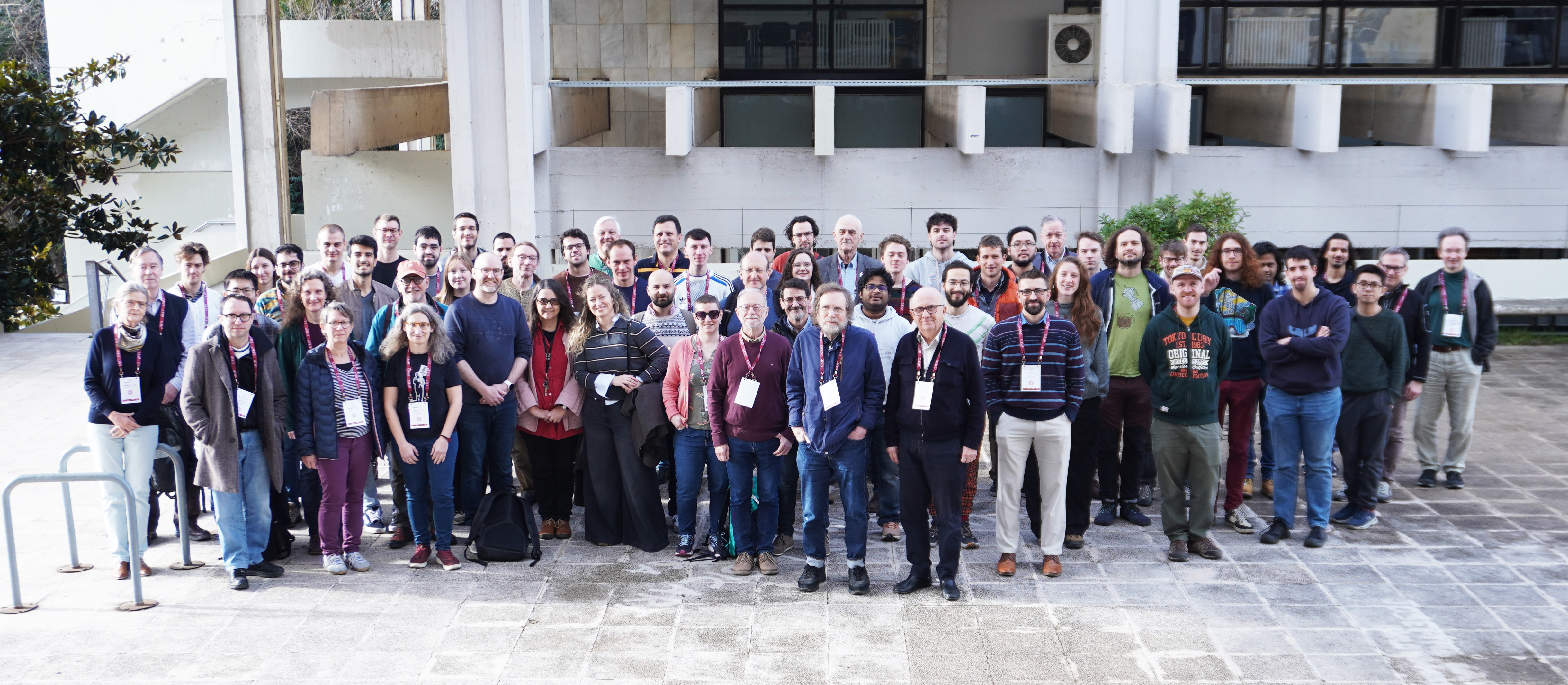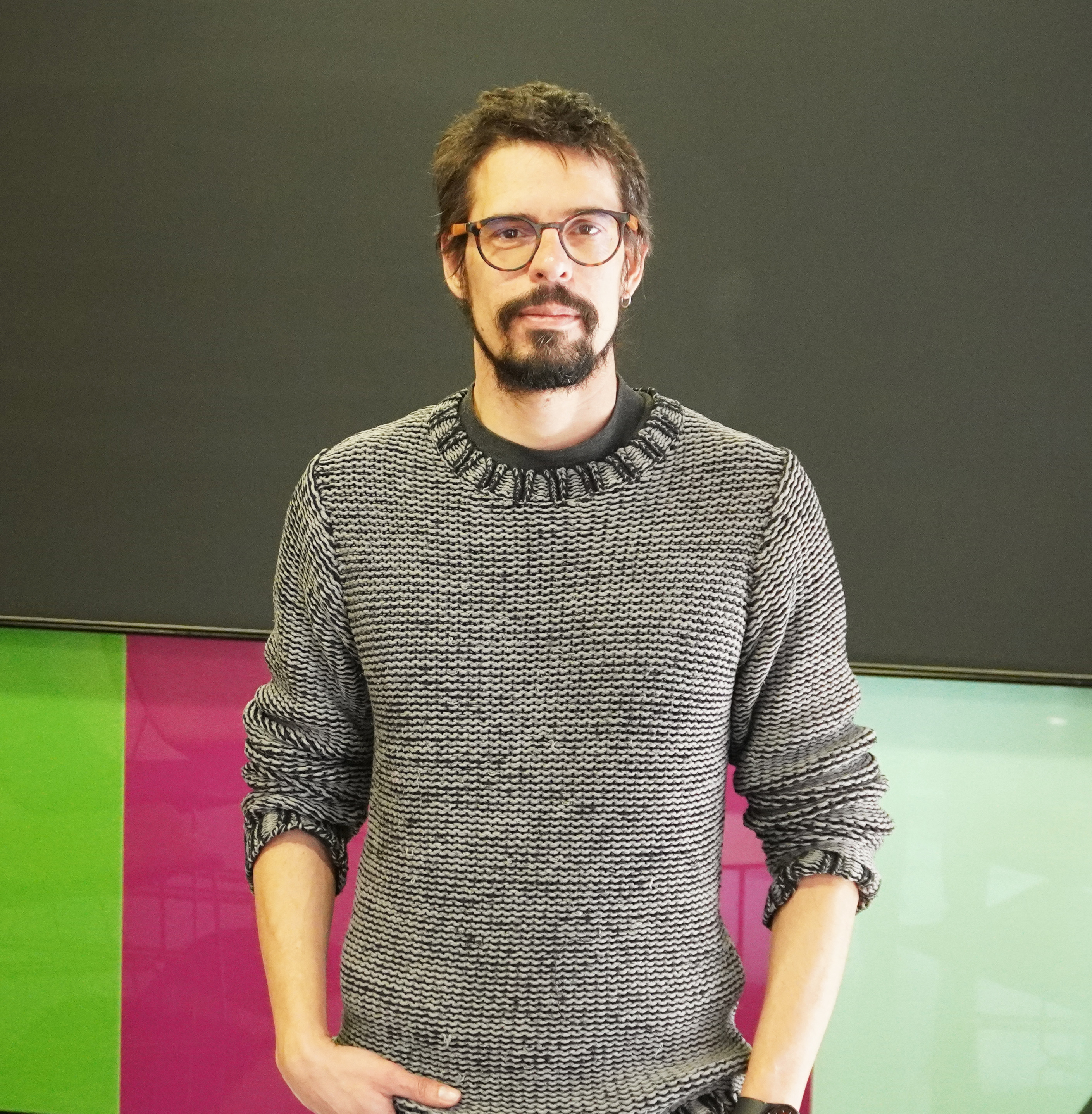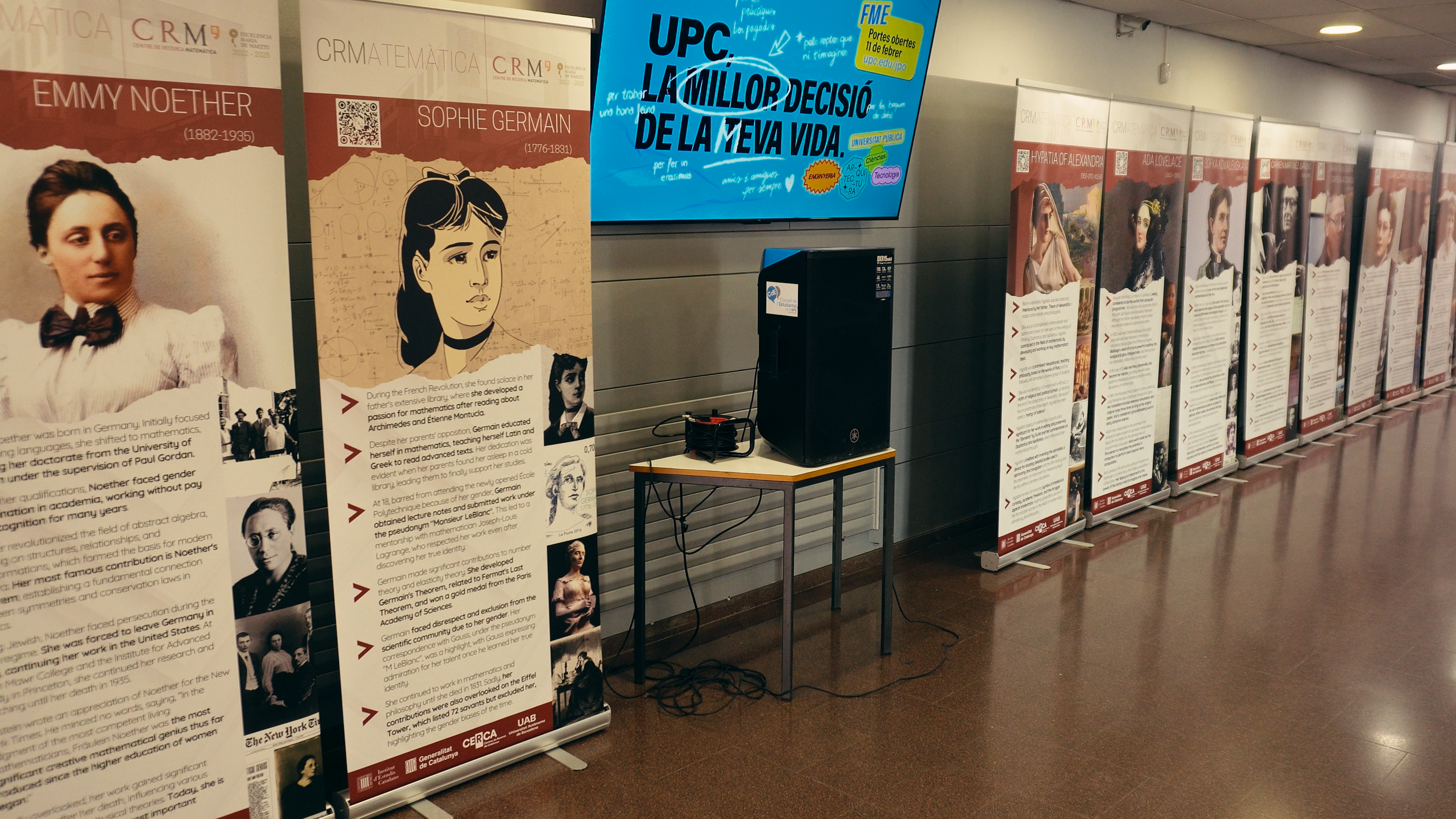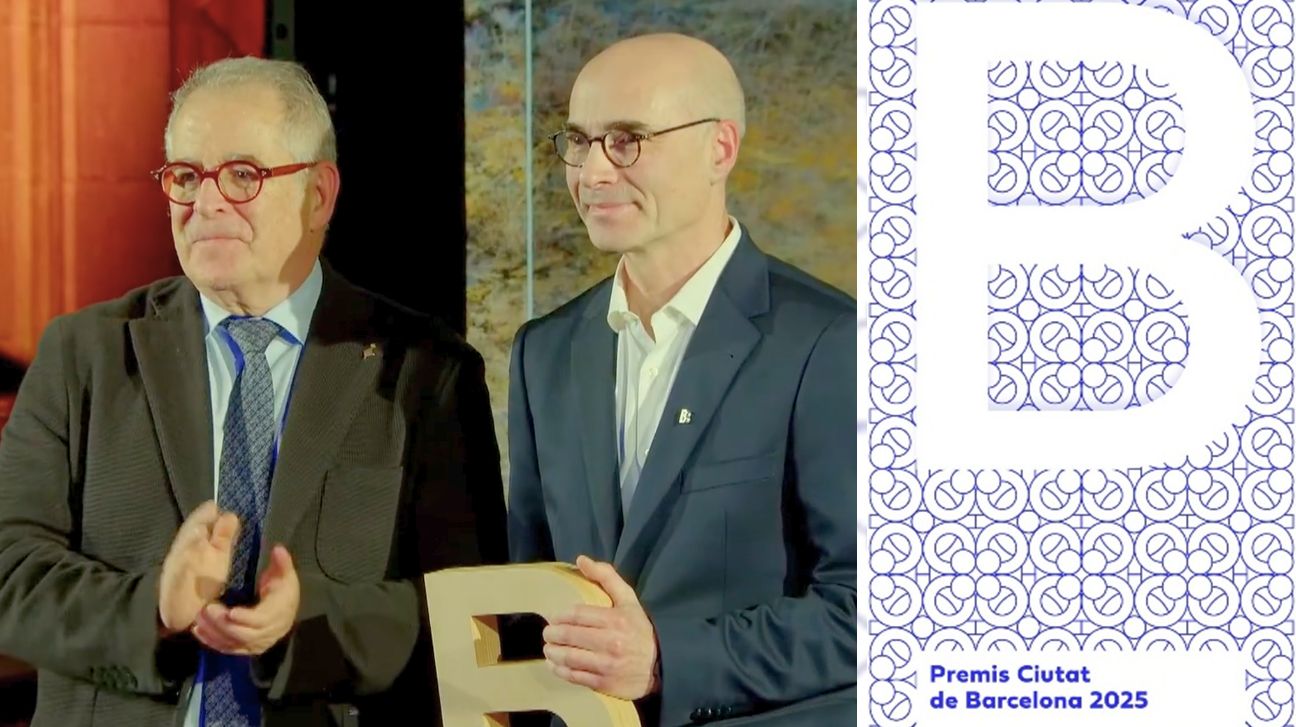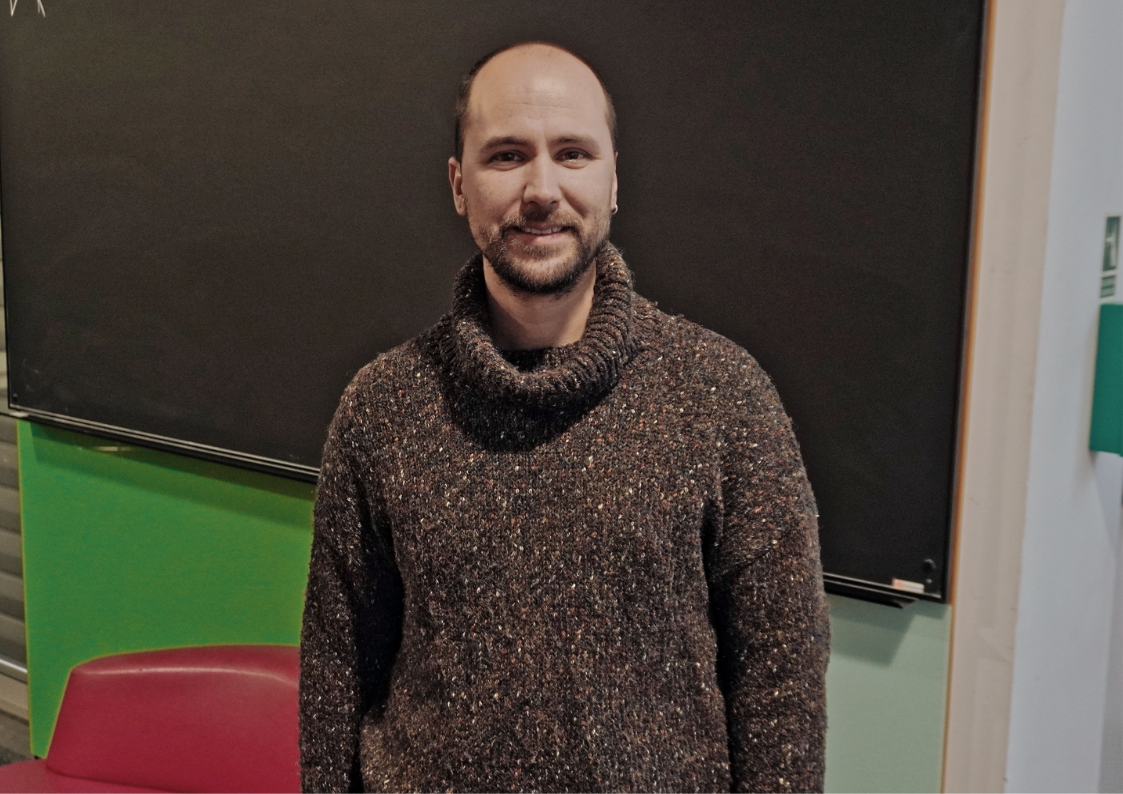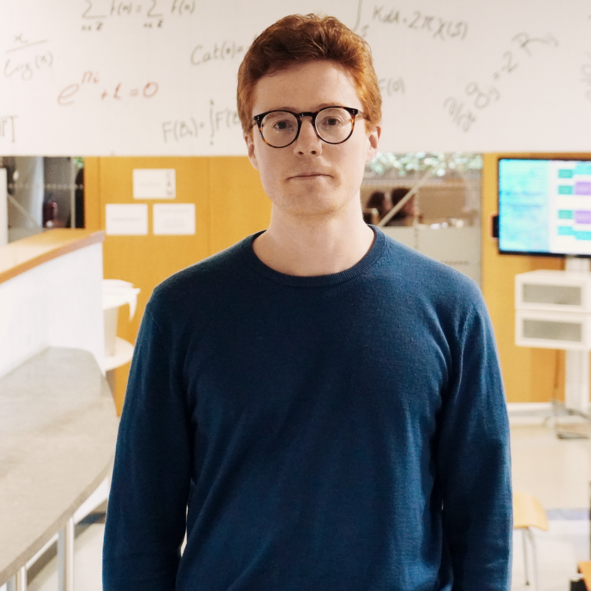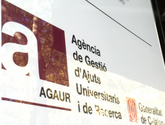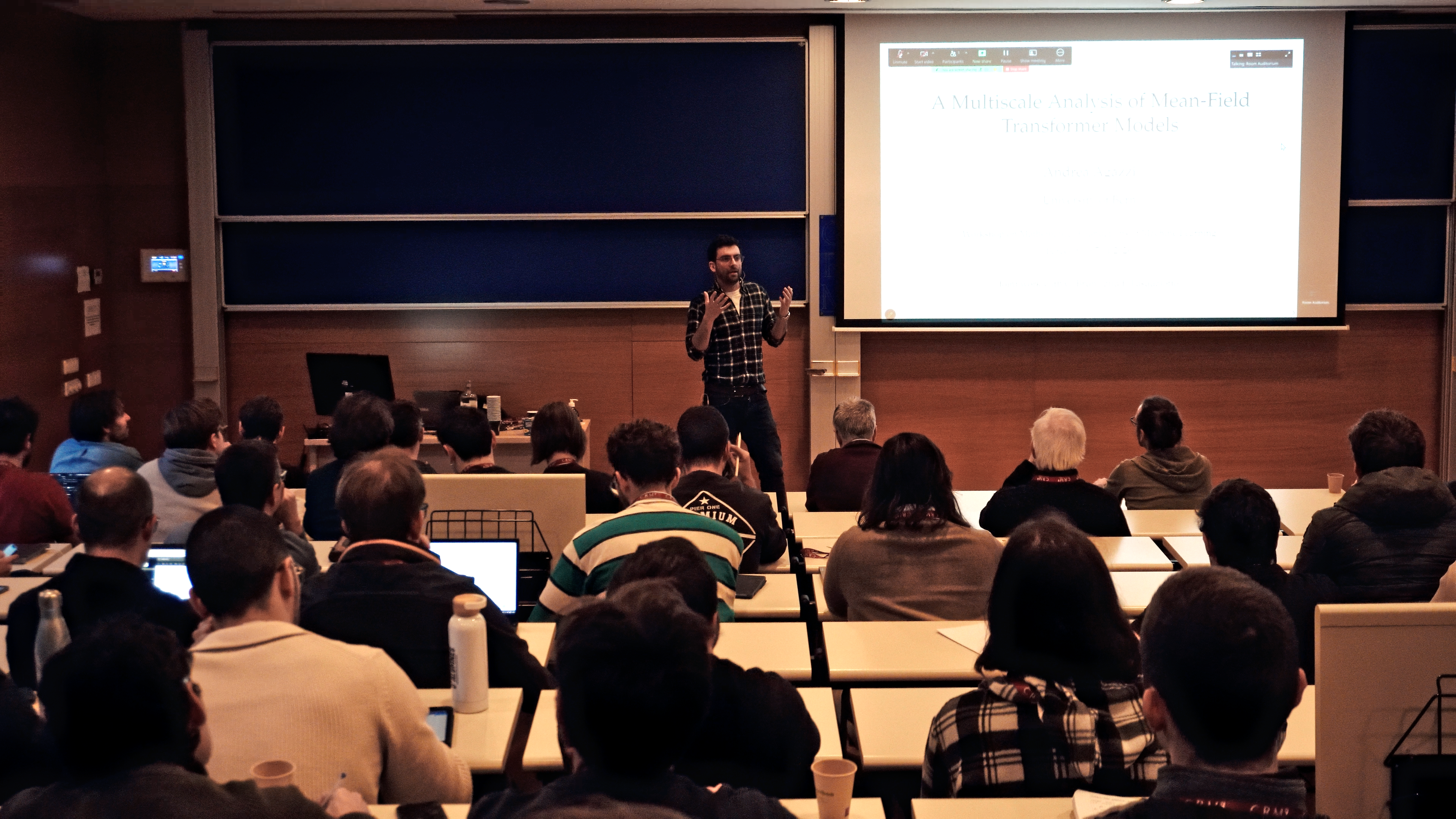On the 13th of February of 2023, the Kick-off meeting of the project Dynamical systems and computational mathematics towards the optimization of Therapeutic Interfering ParticleS as AntiVIRal therapy (TIPSAVIR) took place at the Centre de Recerca Matemàtica (CRM). The project is a Proof of Concept build upon the research performed in “The Mathematical Underpinnings of System Biology”, both funded by the Ministerio de Ciencia e Innovación (MICINN). The PIs from the project (and the previous one) are CRM’s researchers Josep Sardanyés and Tomás Alarcón, from the Mathematical and Computational Biology group.
Presenting the project
Lluis Alsedà (CRM’s director) opened the day expressing his delight for presenting a project of such an interdisciplinary nature – project in which he also participates as part of the research team. The project, that combines different research fields, from mathematics to virology, aligns to an interdisciplinary approach to research that the center is determined to encourage.
Josep Sardanyés, one of the project PIs, was in charge of presenting the project to the audience. As the motivation of the project, he explained the major burden viruses are for public health and economy (affecting, for example, agriculture). Despite that, the antiviral options available in the market are limited. One of the reasons is that viruses are extremely evolvable, thus, hard for the antiviral treatments and immune system to fight. The mutations can sometimes lead to Defective Viral Genomes (DVGs, incomplete copies of virus genomes) and if they keep the sequences that allow them to bind and replicate, they then can become Defecting Interfering Particles (DIPs). These particles are not harmful and replicative by themselves, but need to co-infect with the full virus, competing with it for cellular resources thus causing interference. DIPs have also been suggested to have the potential for transmission and immune system triggering.
Therapeutic Interfering Particles (TIPs), antiviral preparation engineered with the same philosophy as DIPs, have great potential to interfere with the replication of the standard virus, fighting for critical viral replication resources and reducing the virus replication rate.
The project is focused in designing TIPs using mathematical modeling and computer simulations. This approach will involve population dynamical models using Dynamical Systems Theory and tools from Artificial Intelligence (AI). The main goal is to be able to design highly interferent TIPs in a systematic and automated way, thus performing an enormous explorations of potential TIPs candidates with large interferent properties.
The scientific talks
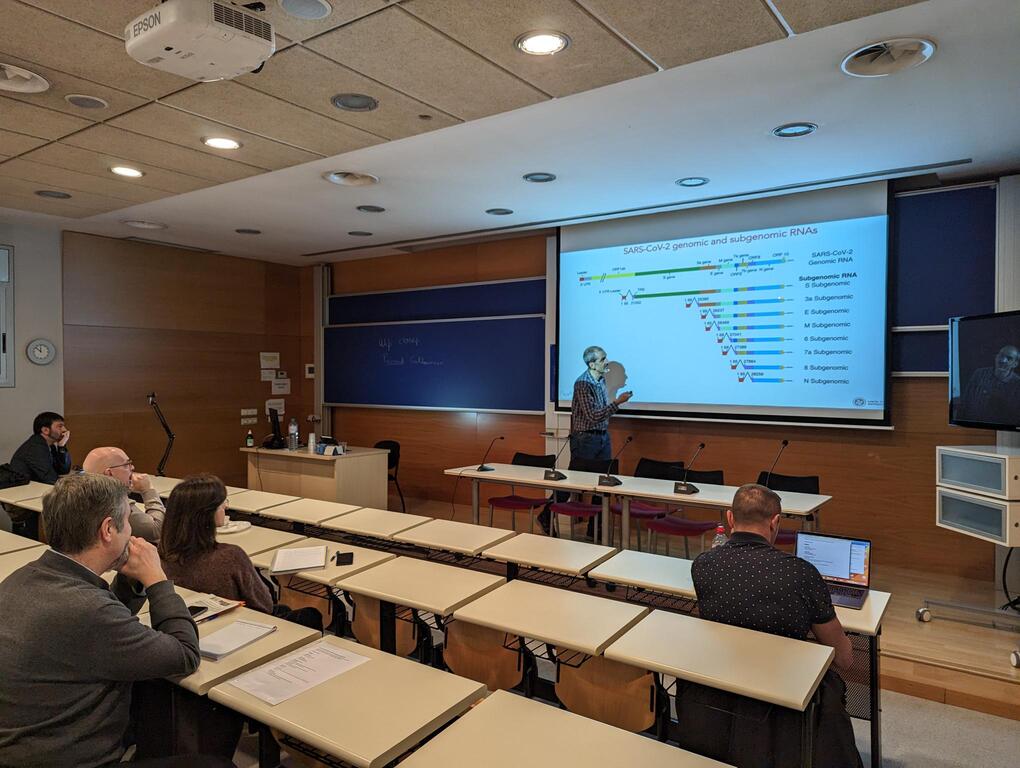 Santiago F. Elena in the middle of his scientific talk
Santiago F. Elena in the middle of his scientific talk
Santiago F. Elena, CSIC Professor at the Institute for Integrative Systems Biology (I2SysBio) and part of the research team of the project was in charge of giving the first scientific talk. Dr. Elena’s role will be to provide experimental data and ensure mathematical models are well ground in biological observations.
In the talk, entitled ‘Experimental evolution of betacoronavirus Defective Viral Genomes’, he gave an overview of the State-of-the-art of the research on DVGs. He explained the different defects present on virus genomes and their research on their identification and characterization of types and variabilities.
Lluis Alsedà, CRM director and researcher whose role in the project will be to supervise the design and implementation of the simulation models to investigate the evolutionary dynamics of DIPs, gave the second scientific talk.
He introduced AI tools for the simulation of DIPs production, discussing computational constraints and issues and showing first results based on initial simulations.
TIPSAVIR is the first scientific project obtained in collaboration with I2SysBio. These two centers built a CSIC associated unit (AU) in 2018. Since then, the AU has celebrated several activities including seminars, scientific meetings, and has published several articles in peer-review international journals (link).
The Translation Advisory Board
Last but not least, a discussion with the Translation Advisory Board (TAB) moderated by Dr. Arantxa Sanz (also part of the work team of the project) took place. In a project that combines two disciplines and has the aim of having a direct social impact, besides strong research, further expertise is needed, in terms of regulatory issues, scaling up the product and clinical expertise. Therefore, the TAB has been appointed to fulfill this gap from research to society, and most of its members were also present in the kick-off day.
The board counts with Isabel Amat (Reig Jofre), Jose Luis Cabero, Esther Riambau (Oniria Therapeutics CEO), Dr. Francisco Rodríguez Frias (Vall d’Hebron Institut de Recerca, VHIR), Dr. Josep Quer (VHIR), Dr. Maria-Carla Saleh (Pasteur Institute in Paris) and Marco Vignuzzi (A*STAR ID Labs).
 Josep Sardanyés, principal investigator of the project, presenting the team.
Josep Sardanyés, principal investigator of the project, presenting the team.
Besides Josep Sardanyés, Tomás Alarcón, Santiago F. Elena and Lluis Alsedà, the research team of the project will be rounded up with Pau Reig as a research technician. The work team, in addition to Arantxa Sanz, is constituted by Julia Hillung, María José Olmo-Uceda, David Romero and Carla Rubio.
To follow the advances of the project, keep track of the page (TBP).

CRM Comm Team
Anna Drou | Pau Varela
CRMComm@crm.cat
Subscribe for more CRM News
When Symmetry Breaks the Rules: From Askey–Wilson Polynomials to Functions
Researchers Tom Koornwinder (U. Amsterdam) and Marta Mazzocco (ICREA-UPC-CRM) published a paper in Indagationes Mathematicae exploring DAHA symmetries. Their work shows that these symmetries shift Askey–Wilson polynomials into a continuous functional setting,and...
Homotopy Theory Conference Brings Together Diverse Research Perspectives
The Centre de Recerca Matemàtica hosted 75 mathematicians from over 20 countries for the Homotopy Structures in Barcelona conference, held February 9-13, 2026. Fourteen invited speakers presented research spanning rational equivariant cohomology theories, isovariant...
Three ICM speakers headline the first CRM Faculty Colloquium
On 19 February 2026, the Centre de Recerca Matemàtica inaugurated its first CRM Faculty Colloquium, a new quarterly event designed to bring together the mathematical community around the research carried out by scientists affiliated with the Centre. The CRM auditorium...
Trivial matemàtiques 11F-2026
Rescuing Data from the Pandemic: A Method to Correct Healthcare Shocks
When COVID-19 lockdowns disrupted healthcare in 2020, insurance companies discarded their data; claims had dropped 15%, and patterns made no sense. A new paper in Insurance: Mathematics and Economics shows how to rescue that information by...
L’exposició “Figures Visibles” s’inaugura a la FME-UPC
L'exposició "Figures Visibles", produïda pel CRM, s'ha inaugurat avui al vestíbul de la Facultat de Matemàtiques i Estadística (FME) de la UPC coincidint amb el Dia Internacional de la Nena i la Dona en la Ciència. La mostra recull la trajectòria...
Xavier Tolsa rep el Premi Ciutat de Barcelona per un resultat clau en matemàtica fonamental
L’investigador Xavier Tolsa (ICREA–UAB–CRM) ha estat guardonat amb el Premi Ciutat de Barcelona 2025 en la categoria de Ciències Fonamentals i Matemàtiques, un reconeixement que atorga l’Ajuntament de Barcelona i que enguany arriba a la seva 76a edició. L’acte de...
Axel Masó Returns to CRM as a Postdoctoral Researcher
Axel Masó returns to CRM as a postdoctoral researcher after a two-year stint at the Knowledge Transfer Unit. He joins the Mathematical Biology research group and KTU to work on the Neuromunt project, an interdisciplinary initiative that studies...
The 4th Barcelona Weekend on Operator Algebras: Open Problems, New Results, and Community
The 4th Barcelona Weekend on Operator Algebras, held at the CRM on January 30–31, 2026, brought together experts to discuss recent advances and open problems in the field.The event strengthened the exchange of ideas within the community and reinforced the CRM’s role...
From Phase Separation to Chromosome Architecture: Ander Movilla Joins CRM as Beatriu de Pinós Fellow
Ander Movilla has joined CRM as a Beatriu de Pinós postdoctoral fellow. Working with Tomás Alarcón, Movilla will develop mathematical models that capture not just the static architecture of DNA but its dynamic behaviour; how chromosome contacts shift as chemical marks...
Criteris de priorització de les sol·licituds dels ajuts Joan Oró per a la contractació de personal investigador predoctoral en formació (FI) 2026
A continuació podeu consultar la publicació dels criteris de priorització de les sol·licituds dels ajuts Joan Oró per a la contractació de personal investigador predoctoral en formació (FI 2026), dirigits a les universitats públiques i privades del...
Mathematics and Machine Learning: Barcelona Workshop Brings Disciplines Together
Over 100 researchers gathered at the Centre de Recerca Matemàtica to explore the mathematical foundations needed to understand modern artificial intelligence. The three-day workshop brought together mathematicians working on PDEs, probability, dynamical systems, and...



